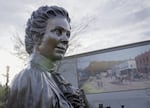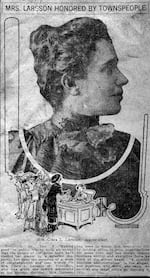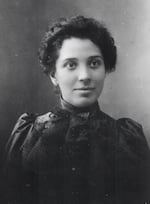Troutdale is known today as the gateway to the Columbia River Gorge, a quaint city marking for passersby where the Portland metro ends and the great outdoors begin.
Stop at Mayors Square in its historic downtown, however, and Troutdale’s little-known feminist past is plainly and proudly visible. Gazing across the city is a life-size bronze monument in honor of former mayor Clara Latourell Larsson.

The Clara Latourell Larsson bronze monument in Mayors Square in Troutdale, Ore. Nov. 20, 2023. Larsson was Troutdale’s first and Oregon’s second female mayor.
Arya Surowidjojo / OPB
On Dec. 3, 1913, Larsson was elected Troutdale’s first female mayor, beating incumbent and saloon keeper S.A. Edmunson by a margin of five votes.
She became Oregon’s second acting female mayor, just one year after Oregon women achieved the right to vote and six years before suffragists earned that right nationwide through the 19th Amendment to the U.S. Constitution.
‘A strictly business administration’
Clara Latourell Larsson was part Indigenous. Her grandmother, Betsy White Wing, was Chinookan and most likely raised in the village of gaɬawašúxʷal, near present-day Washougal, Washington.
At the time of her campaign, Larsson was 38 years old, a remarried divorcée and had served as a clerk of the local school board.
Upon election, Larsson faced the task of governing a recently incorporated railroad and “good times” saloon community.

A newspaper clip from the Oregon Sunday Journal published on December 7, 1913, reporting on Clara Latourell Larsson’s mayoral election victory.
Courtesy of the Troutdale Historical Society
“The town was young and growing and raucous and rowdy,” said author and Troutdale Historical Society board member Helen Wand. “And she was a voice of reason in a time when things were pretty topsy-turvy.”
During her time in office, Larsson chalked up multiple accomplishments on top of handling daily city affairs.
She helped establish the first Troutdale Library, passed the city’s first speed limit at 15 miles per hour and rebuilt parts of the city damaged after a fire in 1915.
“— The Oregon Sunday Journal, December 7, 1913‘A strictly business administration’ is her slogan, and business will start, she says, as soon as she takes office.”
“Her superlative was her ability to reach out to people in a friendly manner, but getting the job done,” Wand said.
“There was a meat processing company and there were sawmills — we had all these workers that were in town and Clara was able to make her voice heard.”
Larsson ended up serving two terms and paved the way for her friend and fellow activist, Laura Bullock Harlow, to be elected as the second female mayor of Troutdale in 1924.
Rural Gender Parity
Female political successes in an early 20th century frontier Oregon town might seem surprising.
Yet historians like Helen Wand suggest that female leadership was more prevalent in rural settings like early Troutdale than in urban settings around the United States.

Clara Latourell Larsson’s self-submitted portrait to the press at the time she was elected mayor of Troutdale in November 1913.
Courtesy of the Troutdale Historical Society
“These women came with the men to the frontier, worked beside them and were able to prove their abilities,” Wand says. “They had no way to do that in the Eastern towns.”
The earliest victories of the suffragist movement reflects some of that observation.
Wyoming, Colorado and Idaho, the states where women first won the vote, had large rural populations. This pattern holds up to Oregon’s suffrage election win in 1912. Racial barriers to voting persisted longer for non-white Oregonian women, however.
Although there are no writings suggesting Clara Latourell Larsson considered herself a suffragist, she nevertheless left a quiet record of civic duty that continued after she left the mayor’s office — as a Troutdale city councilwoman.
Larsson died on June 23, 1939. Written at the base of her bronze monument: “First woman mayor of Troutdale — 1914. 25 years leading her community.” She simply never stopped serving her windswept city at the mouth of the Gorge.

Learn More About Clara Latourell Larsson’s Chinookan Heritage
- Chinookan peoples have inhabited the land along iyagaytɬ imaɬ — what’s now called the Columbia River — for at least 10,000 years.
- Thousands of Chinookans lived along the river in extended kinship groups, making it one of the most densely populated areas in North America prior to white colonization.
- This riverine civilization was part of a large trade network that connected the West Coast of today’s Canada and the United States to the interior.
- Chinookan women often led village trade activities and managed resources based on their social position and individual ability.
- Epidemics introduced by white settlers killed nearly 90 percent of Chinookans by the 1840s, and colonial settlement policies stripped them of their land.
- Clara Latourell Larsson’s children passed away when they were young, but some of her grandmother Betsy White Wing’s descendants today are enrolled citizens of the Yakama Nation.
Reading Materials
- It Could Have Been Carpdale: Centennial History of Troutdale, Oregon, 1907-2007, Sharon Nesbit (2007)
- Chinook Resilience, Heritage and Cultural Revitalization on the Lower Columbia River, Jon D. Daehnke (2017)
- The Chinook Nation’s Existential Fight for Recognition, Karina Brown (2022)
